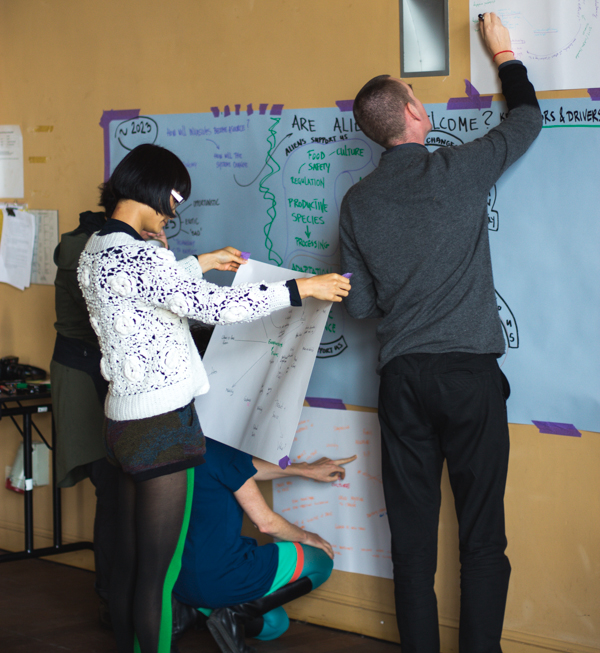This is an old revision of the document!
Debrief Human Invasive Interaction
(Maja's notes)
This was the shortest scenario workshop we have ever attempted to do and our conclusion is that it was: too short! The group was about 15 people, not all of whom know each other, but who all had a specific take on the workshop topic. Most of them were keen to share their knowledge, experience and opinions, but unfortunately such a short workshop meant that we had to cut many interesting conversations (very) short. For this group size and such complex topic a minimum of three hours is needed.
Two experienced facilitators who are used to work together are a must for such short sessions. Nik and I had not previously facilitated a scenario workshop together and had only an hour or so to prepare. This would have been fine if we were used to co-facilitation, as we could have sensed where we could complement each other. We agreed we would improvise, but the problem was that we couldn't quite sense what the other person needed. I remember stumbling over myself to both host conversations and harvest them (very quickly), which meant that I didn't do either very convincingly… What suffered most was the group dynamics, meaning that a few people comfortable with speaking in public were the ones mostly heard, while there were several quiet people who didn't manage to say much…
In August 2013 I did manage to get to rich scenarios with a group of 7 people in just over two hours (programming team of the Vooruit). What was different?
- the group consisted of 6-7 people who know each other well and work in the same organisation
- the motivation was high and there is an urgency in resolving the core question
- there was a prior agreement of what success criteria might be and a clear picture of the present situation
- the introductory session (arrival, framing, icebreaker…) was done outside of the two hours (for about ~1/2 hour before
- there was a lunch planned for after the session, where the conversations kept evolving
- the afternoon session was building on the scenarios (using GROWTH method from Vali Lalioti)
- there was one facilitator who prepared for one day beforehand
What can we improve for a two hour scenario planning:
- If two hours is the only time that can be allocated to the workshop, the size of the group should be smaller and if possible they should meet each other beforehand (or preferably know each other well and see each other often)
- For two facilitators who aren’t used to work together at least one full day of preparation is needed, with clear agreements about who does what when. The flow should be written out in detail and be easily accessible to both facilitators during the process.
- If one of the facilitators is less experienced but knows their strengths, s/he should do only what s/he is good at, without attempting to learn new skills in this fast paced format
- No questioning of the process, or discussion about how to do stuff should happen during the workshop. quick decision making is crucial as there is no time for doubts (better to ask forgiveness than permission in this case)
- The person who is moderating the conversation should not be harvesting (recording) it. It’s better that one person writes and the other moderates, to make sure that everyone is sufficiently heard
- If at all possible, extend the workshop to 3 hours with at least 30mins beforehand for the people to meet each other and an hour of refreshments (lunch, tea, dinner…) and conversation after the workshop
